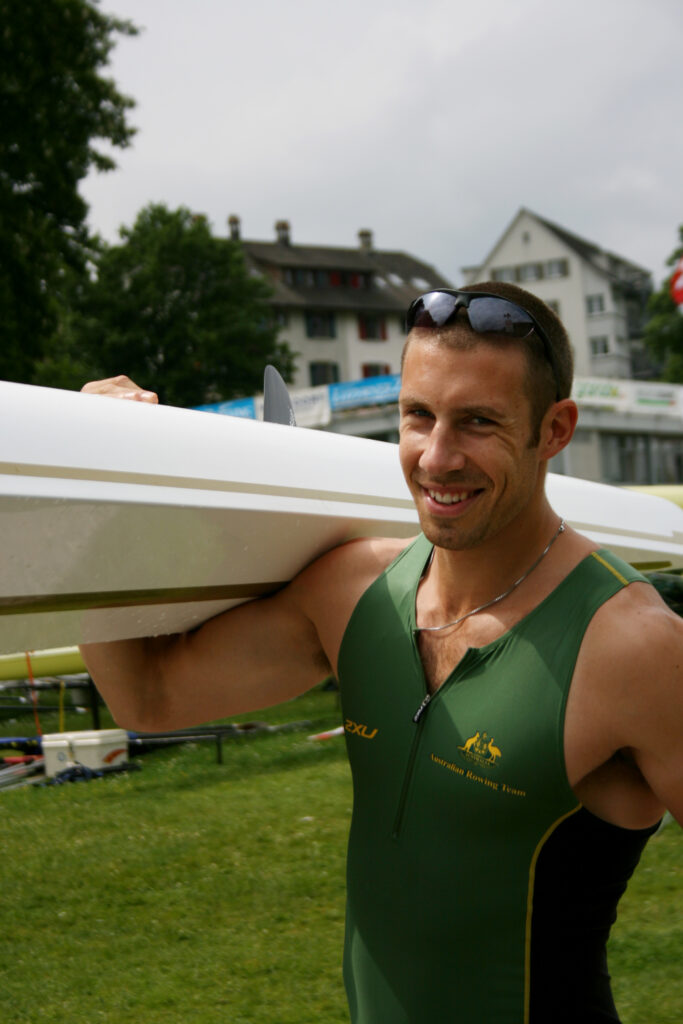
15 Jan 2025
Where are they now? Scott Brennan
A 9-year-old obsession, a life-threatening illness, the death of a mentor, a gold medal, a comeback, a realisation and a completion. Scott Brennan’s rowing career has had it all. Now living with wife and fellow Olympic gold medallist Kim Brennan and their two children, Brennan talks to World Rowing about his journey.
Brennan started rowing after his interest was piqued watching fellow Tasmanian Stephen Hawkins win gold at the Barcelona Olympics. From the beginning Brennan says he loved it. A couple of years into rowing, however, he got sick, very sick.
“A joint infection nearly killed me”.
“This set me on a path of having a different attitude to sport. I was different when I came out of hospital. I was shown that I didn’t have unlimited time and this impacted how I applied myself.”
Brennan saw every rowing session as a gift and with every stroke he wanted to make a difference.
Around the same time he met Sam Le Compte a rowing coach who’d come from New Zealand to Tasmania. Le Compte would become Brennan’s coach and mentor.
At 17 he made the junior national team competing at the World Rowing Junior Championships in the quad. What Brennan remembers the most is watching the single scullers race.
“They were like fully grown men.”

Brennan set a goal to compete in the single and wrote a letter to Le Compte expressing his goal.
“Sam agreed to coach me and his mentorship coupled with my enthusiasm catapulted me forward. He never let me get away with ‘boy’ behaviour, to row not as a junior but as an adult. He kept me in line and had me act like a man and train like a man.”
The following year as a junior, Brennan raced to silver in the single. He then went on to win the single at the World Rowing Under 23 Championships and this set him on a course to be part of the Australian men’s quad for the Athens 2004 Olympic Games. The quad finished seventh.
Not long after Athens, Le Compte died from cancer. He was just 54 years old and the impact on Brennan was huge.
“When Sam died in 2005 I made a vow to him that I’d win gold in Beijing. I’m proud that every day from his funeral to the day of the (Beijing Olympic) final, I kept that in mind.”
Brennan teamed up with David Crawshay in the double sculls and in 2008, at the Beijing Olympics, Brennan’s vow to Le Compte was fulfilled.
After Beijing, Brennan says he was worn out. As well as training for the Olympics, Brennan had also been studying medicine and he admits balancing rowing and studying medicine was not easy. “I was so exhausted I didn’t want to row again. In 2007, I’d graduated, and in 2009 I started my internship; working long hours at the hospital.”
It had been about 18 months and Brennan says he started dreaming about the Olympics again. He couldn’t ignore it. He began training again, reconnected with Crawshay and they started rowing together.
Brennan and Crawshay were back racing internationally in 2011 and looking good for a successful London Olympics. Then injury took its toll. Brennan’s back was not good and they finished the Olympics in eighth place.
Brennan then spent two and a half years trying to rehab. He looked for every solution, even going to Canada to work with a specialist. Eventually, Brennan says, he had to give it away. The injury stemmed from his illness as a teenager which had meant his right leg never worked that well and got worse over time.
Brennan made the decision to retire.
“I woke up one day and knew I was done.”
Although Brennan says the decision to retire was easy, he admits the lead up to the decision was excruciatingly difficult. At the same time as his rowing was coming to an end, his wife Kim was building up to the pinnacle of her rowing career which culminated in an Olympic gold at the Rio Olympics in the women’s single sculls. Brennan became her supporter, juggling this with working in the hospital emergency department.
With Kim, they now have two kids and Brennan has become the full time dad while Kim has gone back to work.
“We made a decision that we wanted one parent at home and because my job was harder, the decision was for me to be the stay-at-home father.”
Brennan also does mentoring for a wide range of people. His body does not allow him to row but he’s a keen mountain biker.
“I do grieve the loss of rowing, but I’ve had to accept the reality that I can’t do it again in any meaningful way.”
Brennan looks back on his rowing as a path to where he is now.
“I feel at times a sporting career is viewed as a finite thing, whereas for me the Olympics was the beginning of something new, of discovering who I am as a person. Going though it set me up for the next stage of life. The Olympics was the beginning upon which to build more.
“I’m proud of my journey and that I became the kind of person I’d aspired to be.”

